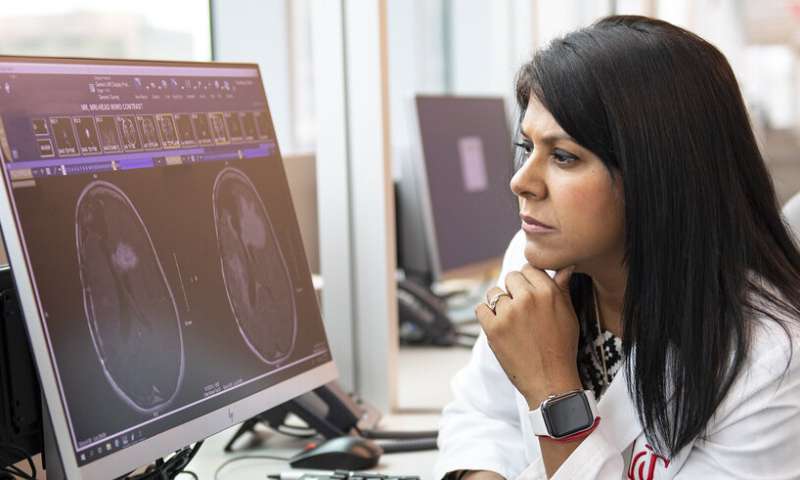
Investigators at the University of Cincinnati are studying whether or not a modified Atkins-type ketogenic diet could help make treatments for a common, but dangerous, type of brain cancer called glioblastoma more effective.
This unique clinical trial, only being offered at UC, will allow experts to follow patients with glioblastoma to see if a ketogenic diet coupled with standard treatment (chemotherapy and radiation) improves outcomes and quality of life.
“Gliomas are among the most invasive and lethal tumors, and there aren’t a lot of effective treatments,” says Rekha Chaudhary, adjunct associate professor at the UC College of Medicine and UC Health oncologist who is co-principal investigator on the study. “Glioblastoma multiforme, commonly called GBM, is the most aggressive primary brain tumor—five-year survival rates for this type of cancer are dismal. To date, the standard of care is chemotherapy and radiation therapy which increases the two-year survival rates by around 10%. But still, just 3% of patients are surviving at the five-year mark.
“We know that cancerous glioma cells rely on glucose, or sugar, for their division and survival. The ketogenic diet is low in sugar and because of that, the body produces ketones for energy. Normal glial or brain cells can survive on ketones alone, but it is thought that cancerous glioma cells cannot use ketones for energy.”
Ketones are chemicals made in the liver, and a person produces them when they don’t have enough insulin to turn sugar into energy. Since the body needs another source, it uses fat instead, and the liver turns this fat into ketones, a type of acid, and sends them into the bloodstream.
Chaudhary says a ketone metabolism has been used to control childhood epilepsy for many years but not much is known about what ketones do in the brain—only that they seem to help brain disorders. It’s also among the newest weight loss methods showing up on the news and internet in the last decade.
“Results for a modified keto diet in animal models were really hopeful,” she adds. “Researchers in previous studies implanted animal model brains with cancerous glioma cells to study the effect of ketosis on their survival and to monitor what happened to the glioma cells; the models had a modest increase in survival with ketogenic diet as compared to controls not on the ketogenic diet. However, when radiation was added to the treatment of ketogenic diet there was a significant increase in survival, so much so that 9 out of the 11 animal models were cured of their tumors.”
https://youtube.com/watch?v=UpCRrysea1E%3Fcolor%3Dwhite
“This is why we think that ketones may act as a radiation sensitizing agent, and this would explain the significantly increased survival in the animal models on the ketogenic diet with radiation as compared to the models on the ketogenic diet alone,” Chaudhary adds. “Initially, this was thought to work because of the low sugar state; however, other animal model studies have shown that not only do the brain tumors implanted in animals take up the ketones, but also they use them for energy. This led us to the hypothesis that perhaps the ketones are being taken up in the tumors and are making the tumors more sensitive to radiation. There is limited data in humans with ketogenic diets and cancer but because of the preliminary data in animal models and retrospective data in humans with glioblastoma, trials are beginning to pop up.
“Now, we’re adding radiation to the mix to see if outcomes can improve even more.”
A retrospective study, presented via poster at the 2019 American Association of Clinical Oncology Annual Meeting in early June, revealed promising results. Researchers reviewed patient charts to look at MRI results as well as β-hydroxybutyrate (BHB) levels, a predominant ketone, and reviewed their outcomes. There were 30 patients included in the study and all of them achieved ketosis which is the goal of the diet.
“It is too early to assess survival,” says Chaudhary. “However, we did see a significant increase in the amount of pseudoprogression on the MRI. Pseudoprogression is a sign of radiation sensitization, meaning the tumors may have become more sensitive to the radiation because of the diet. There was an increase in radiation sensitization showing on MRI scans within patients on the ketogenic diet as compared to historical control populations. Pseudoprogression or radiation sensitization has been traditionally associated with increased survival.”
The latest trial will run in a similar fashion, with 30 patients being evaluated over 11 weeks. They’ll meet with Tamara Ward, registered dietitian and co-PI on the study, one to four weeks prior to their first radiation and chemotherapy treatments to be educated about the diet and what is needed for it. The diet will begin approximately seven days prior to treatment, and the patient will continue the study diet until the first post-radiation MRI, a time period of approximately 10 weeks.
“We will obtain blood to assess serum BHB, fasting insulin and glucose and other chemistries as well as body weight weekly, according to the standard of care, while on chemotherapy and radiation therapy,” Chaudhary says. “Participants will receive weekly phone calls from a registered dietician to address any questions or concerns regarding the diet, and a food diary will be used to assess adherence during the 10-week period. All info from food diaries will be entered into nutrient analysis software and will be used to identify potential problematic intake which may be preventing patients from achieving ketosis.
“We are also doing special MRI scans called MR spectroscopy to measure the amount of ketones in the brains of the patients. This will tell us if the ketones are really getting into the brains of these patients to help test our theory.”
Source: Read Full Article
